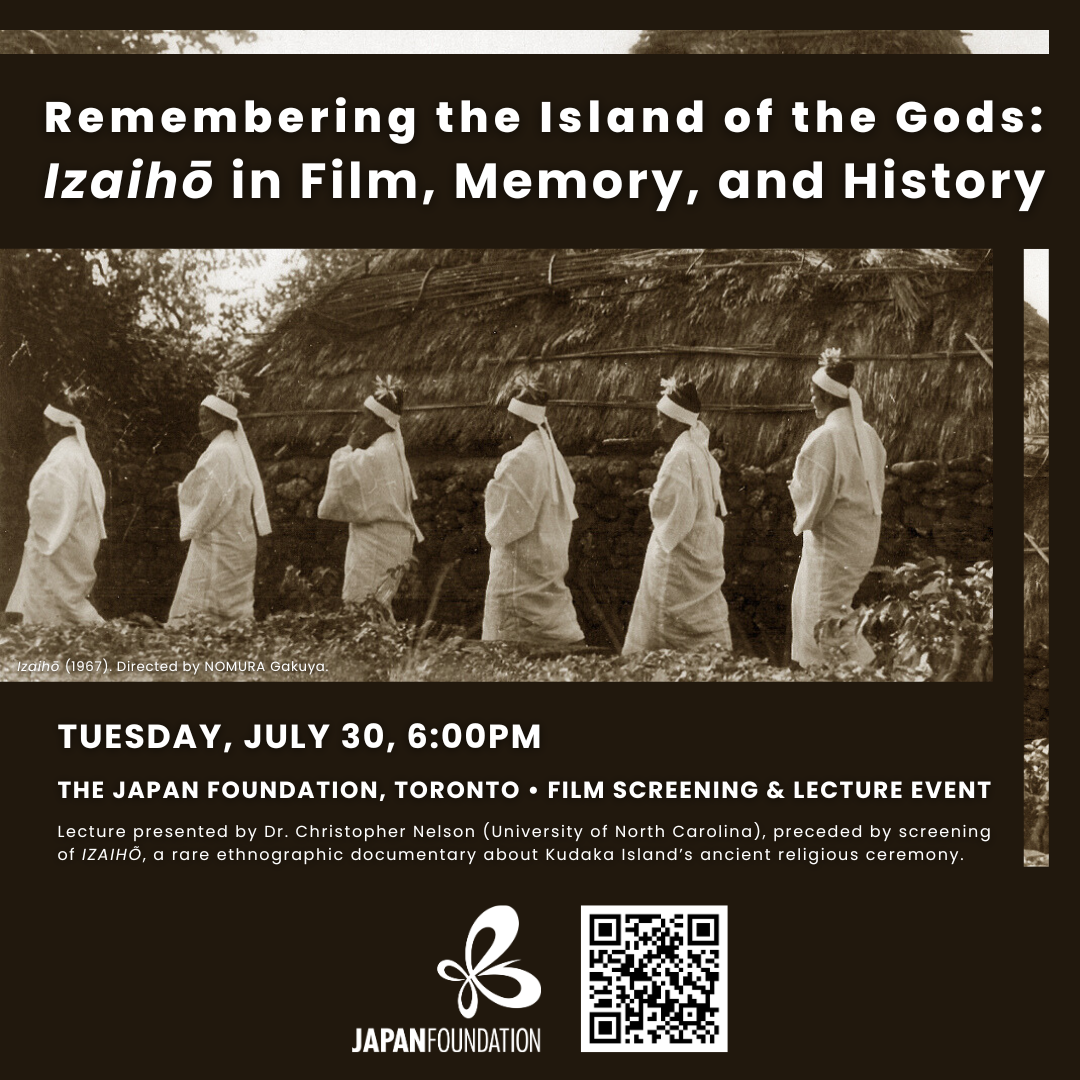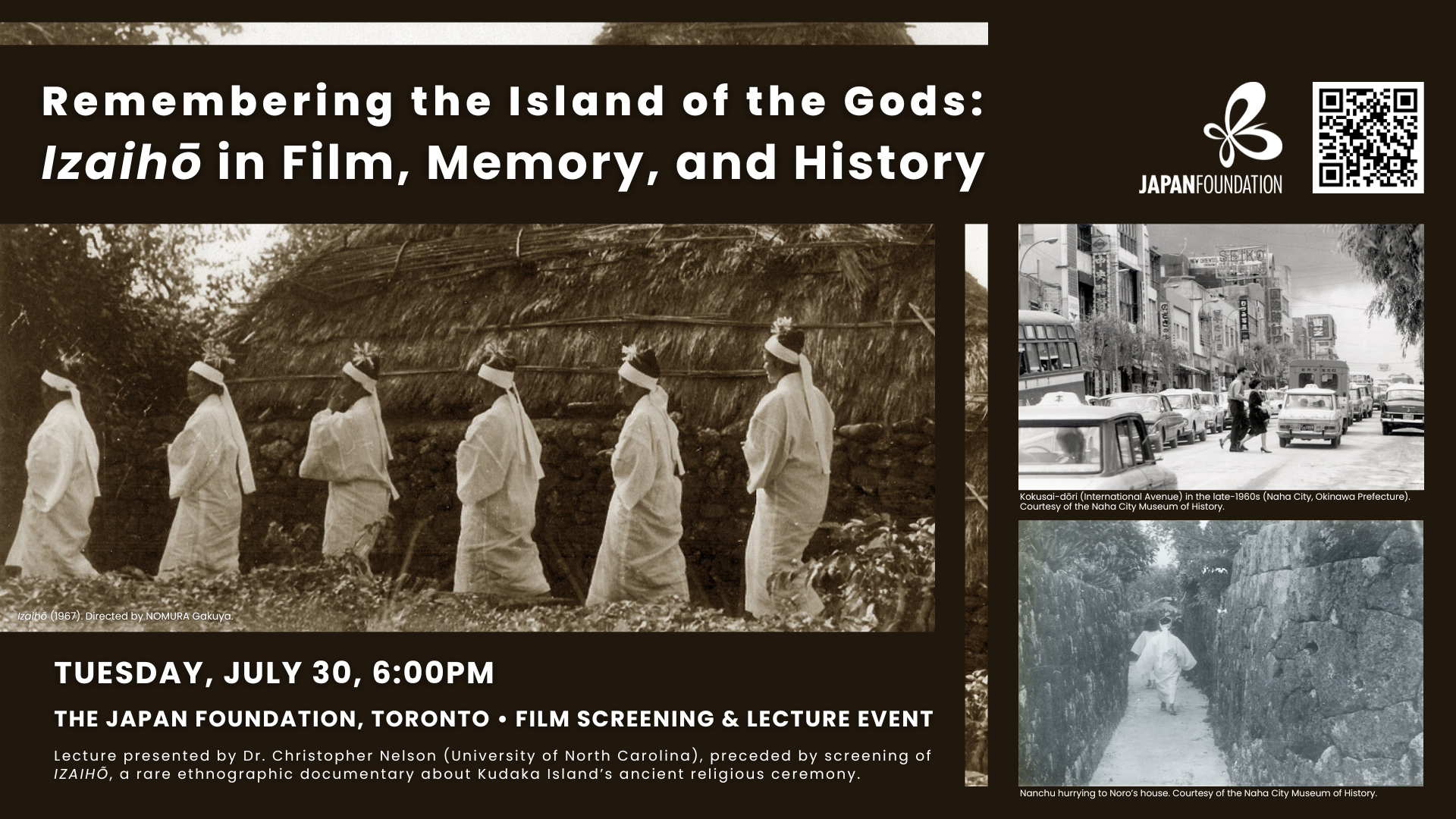Remembering the Island of the Gods: Izaihō in Film, Memory, and History

- This event has passed.
July 30th, 2024 @ 6:00 pm - 8:15 pm EDT
Details » Click here to register »

Reservations are now closed. Thank you for your interest. We will have a rush line before the event, and will start to release unclaimed seats 10 minutes before the event.

Remembering the Island of the Gods: Izaihō in Film, Memory, and History
Tuesday, July 30, 6:00PM (ET)
Doors open 5:30PM | Film Screening & Lecture Event | In-Person | JFT Event Hall
NOMURA Gakuya’s film Izaihō vividly captures the rhythms of everyday life on Kudaka Island, as well as the planning and performance of one of the final Izaihō. The experience of watching the film is so fascinating that we might not give much thought to its historical context. And yet, in 1968, the main island of Okinawa, only a few kilometers to the west, was in the midst of significant social and political turmoil. Ordinary people still struggled to come to grips with the consequences of the Battle of Okinawa, only two decades earlier, in which 150,000 Okinawan civilians were killed, and most cities and villages destroyed. Unlike mainland Japan, Okinawa remained under American military occupation. Rebuilding homes and businesses was difficult, and the future was unclear. Charged debates over independence, continued subordination to the United States, or return to Japanese rule took place everywhere, from public meetings to the kitchen table. Citizens took to the streets to protest economic disparity, the use of Okinawan bases to fight the war in Vietnam, and their lack of political self-determination. How does an understanding of this context shape our understanding of Nomura’s film? How can the film help us to have a more complex understanding of that moment in time?
Speaker Profile:
Christopher T. Nelson is a cultural anthropologist at the University of North Carolina at Chapel Hill. For nearly three decades, he has done ethnographic fieldwork in Okinawa, Japan. His work focuses on the relationship between history and memory, and he has a deep interest in storytelling, ritual and performance.
His new book, When the Bones Speak: The Living, the Dead, and the Sacrifice of Okinawa, an ethnography of laborers, artists, ethnologists, political activists, shaman and the dead in Japan, will be published by Duke University Press in the spring of 2025.
About the film:
Izaihō
Directed by NOMURA Gakuya • 1967 • Documentary • 49 minutes • Presented in Japanese with English subtitles • Trailer
Kudaka Island is a half-agricultural and half-fishing remote island where the men run the fishing industry and the women do the agriculture. Life on the small island is not easy. They share the scarce water and share the land fairly with an allotment system. When the boys become men, they all go out the sea. The women come together around the rituals, praying for the safety of the journeying men and protection of the island. The men are fishermen and travelers, and the women are priestesses who protect them. Kudaka Island has long been known as the “island of the gods,” and 30 yearly rituals embedded into island life are solemnly passed down by the islanders even to this day. Held once every 12 years on the year of the horse, Izaihō is Kudaka Island’s greatest ritual. During Izaihō, women from the ages of 30 to 41 who were born on and live on the island become gods.
This film captures the Izaihō performed in 1966. The ritual was held once more in 1978 and then vanished — an unusual occurrence. While many of Japan’s festivals and rituals are becoming mere charades as they transform into tourist attractions in order to survive, Izaihō disappeared while it was still in practice and remained representative of the spirit of the people of Kudaka Island.
This is the final event of our Keep Dancin’, Okinawa! film series, in celebration of Okinawan stories, culture, and history.
Free admission. Register below.


